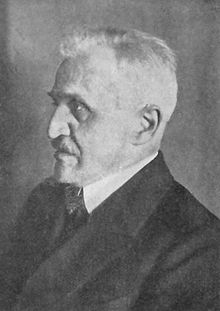Waclaw Berent
Wacław Berent (born September 26 , 27 or 28, 1873 in Warsaw , † between November 19 and 22, 1940 there ) was a Polish writer of the Young Poland .
Life
Little is known about Berent's life; shortly before his death, he destroyed his personal archive, including his correspondence. He was born the son of an optician whose family originally moved there from Berent (now Kościerzyna ). In Warsaw he attended Wojciech Górski's private high school . He then studied natural sciences in Krakow, Zurich and Munich. In 1894 he made his debut in the magazine Ateneum with the story Nauczyciel ( Teacher ), followed in the same year by Przy niedzieli ( On Sunday ) in Gazeta Polska . He used his pseudonym here and laterWladyslaw Rawicz . He wrote his dissertation in German on the subject of knowledge of the parablast and the differentiation of cotyledons in the egg of bony fish in 1895 or 1896. During his studies he had contact with socialists such as Rosa Luxemburg and Julian Marchlewski as well as with Bohème . After returning to Warsaw, he sympathized with the Polish Socialist Party and was a founder of a society for the support of political prisoners. He was also a close associate of Chimera magazine from 1900 to 1907 . He was in a relationship with Bronisława Ostrowska and later became friends. In 1920 he was a member of the editorial board of the monthly Nowy Przegląd Literatury i Sztuki ( New Literature and Art Show ). In 1929 he was the editor-in-chief of Pamiętnik Warszawski ( Warsaw Diary ). The details of the day of his death are different; between November 19 and 22, 1940.
plant
From 1895 Wacław Berent published scientific articles in the newspaper Wszechświat ( Space ). The writer's four novels are all experimental and did not appeal to a large readership. Despite everything, Berent is considered one of the most important stylists in the Polish language. His debut novel Fachowiec ( specialist ) also appeared in 1895. This deals critically with the ideals of positivism and the myth of class solidarity. In 1903 the novel Próchno ( rotten wood , published in German as Pestilenz ) appeared, which dispenses with an omniscient narrator and in which the author dispenses with an evaluation of the events. The novel received a very controversial reception. In the 1911 novel Ozimina ( Wintersaat ), the characters speak without the author indicating who is speaking. The novel was widely understood as a call to restore an independent Polish state. The fourth novel Żywe kamienie ( Living Stones ) was written before the First World War, but was not published until 1918. The novel takes place in the 14th century.
Publications
Novels
- Nauczyciel 1894
- Fachowiec , 1895
-
Próchno , 1903
- German Pestilenz , Weimar 1986, ISBN 978-3-378-00064-3
-
Ozimina , 1911
- German Wintersaat , Frankfurt am Main 1985, ISBN 978-3-518-03579-5
- Żywe kamienie , 1918
Essays
- Idea w ruchu rewolucyjnym , 1905/1906
- Onegdaj. Mowa miana przy otwarciu Polskiej Akademii Literatury , 1933
- Diogenes w kontuszu , 1937
Web links
Footnotes
- ↑ a b c d e University of Gdansk, Dr. Marek Adamiec, Wacław BERENT , accessed on February 10, 2019
- ↑ a b c d e f g h i j Karl Dedecius (Ed.), Panorama of Polish Literature - IV Portraits , Zurich 2000, pp. 34–38, ISBN 3-250-50004-6
- ↑ Jerzy R. Krzyzanowski in Britannica, Wacław Berent , accessed on February 10, 2019
| personal data | |
|---|---|
| SURNAME | Berent, Waclaw |
| ALTERNATIVE NAMES | Rawicz, Wladyslaw (pseudonym) |
| BRIEF DESCRIPTION | Polish writer |
| DATE OF BIRTH | September 1873 |
| PLACE OF BIRTH | Warsaw |
| DATE OF DEATH | November 1940 |
| Place of death | Warsaw |
